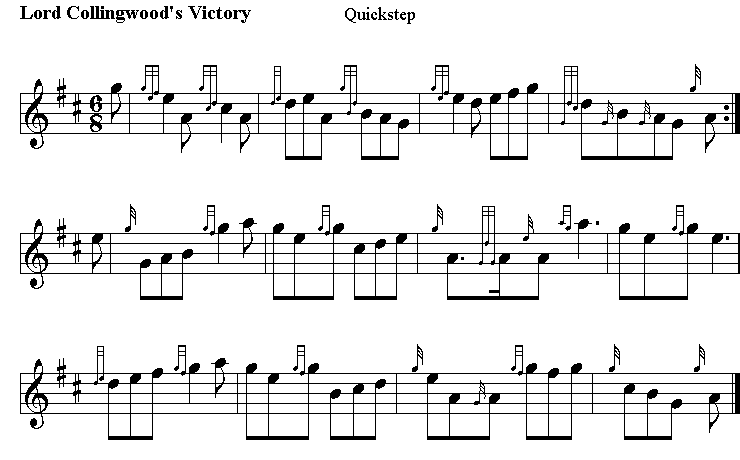|
Vice Admiral Cuthbert Collingwood, 1st Baron
Collingwood (26 September 1748 – 7 March 1810)
was an admiral of the Royal Navy, notable as a
partner with Lord Nelson in several of the
British victories of the Napoleonic Wars, and
frequently as Nelson's successor in commands.
Collingwood was born in Newcastle upon Tyne. His
early education was at the Royal Grammar School,
Newcastle. At the age of twelve, he went to sea
as a volunteer on board the frigate HMS Shannon
under the command of his cousin Captain Richard
Brathwaite (or Braithwaite), who took charge of
his nautical education. He spent a total of only
three years on dry land after joining the navy
as a teenager. After several years of service
under Captain Brathwaite and a short period
attached to HMS Lenox, a guardship at
Portsmouth commanded by Captain Robert Roddam,
Collingwood sailed to Boston in 1774 with
Admiral Samuel Graves on board HMS Preston,
where he fought in the British naval brigade at
the battle of Bunker Hill (June 1775), and was
afterwards commissioned as a Lieutenant (17 June
1775).
In 1777, Collingwood first met Horatio Nelson
when both served on the frigate HMS Lowestoffe.
Two years later, Collingwood succeeded Nelson as
Commander (20 June 1779) of the brig HMS Badger,
and the next year he again succeeded Nelson as
Post-Captain (22 March 1780) of HMS Hinchinbrook,
a small frigate. Nelson had been the leader of a
failed expedition to cross Central America from
the Atlantic Ocean to the Pacific Ocean by
navigating boats along the San Juan River, Lake
Nicaragua and Lake Leon. Nelson was debilitated
by disease and had to recover before being
promoted to a larger vessel, and Collingwood
succeeded him in command of the Hinchinbrook
and brought the remainder of the expedition back
to Jamaica.
At Trafalgar, on the death of Nelson,
Collingwood assumed the command-in-chief,
transferring his flag to the frigate Euryalus.
Knowing that a severe storm was in the offing,
Nelson had intended that the fleet should anchor
after the battle, but Collingwood chose not to
issue such an order: many of the British ships
and prizes were so damaged that they were unable
to anchor, and Collingwood concentrated efforts
on taking damaged vessels in tow. In the ensuing
gale, many of the prizes were wrecked on the
rocky shore and others were destroyed to prevent
their recapture, though no British ship was
lost.
On 9 November 1805 Collingwood was promoted
Vice-Admiral of the Red and raised to the
peerage as Baron Collingwood, of Caldburne and
Hethpool in the County of Northumberland. He
also received the thanks of both Houses of
Parliament and was awarded a pension of £2000
per annum. Together with all the other captains
and admirals, he also received a Naval Gold
Medal, his third, after those for the Glorious
First of June and the Cape St Vincent. Only
Nelson and Sir Edward Berry share the
distinction of three gold medals for service
during the wars against France.
 |



